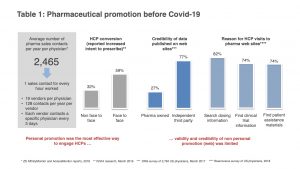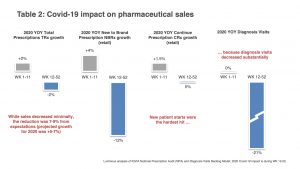
By Noël Theodosiou and Sergio Corbo
Much has been written about the impact of COVID-19 on U.S. life sciences sales in 2020. The overwhelming consensus is that the pandemic expedited a slow, but already present, downward trend in face-to-face sales representative visits and an associated increase in digital engagement.
While some have suggested that face-to-face visits can be largely replaced by virtual ones, most agree that sales rep relationships with healthcare providers are critical and will continue to be their “superpower” (see our article Recharging Sales containing research with sales representatives in pharmaceuticals and medical devices).
In this article, we look back at life sciences promotion pre-COVID, examine the impact of the pandemic on sales and consider the magnitude of this change and what commercial leaders need to do about it.
Relationship-Based
When it comes to sales, the healthcare industry has traditionally taken a relationship-based approach. Personal promotion has long been deemed the most effective way to engage customers.
Even while an increasing number o f healthca re systems and offices were limiting rep access, before the pandemic, the average number of pharma sales contacts per year per physician remained in the thousands, with a large share of those being in-person interactions given that reps traveled approx. 50% of the time. Healthcare providers saw 19 suppliers a year, and each would contact the physician’s office once every three days. (See Table 1)
f healthca re systems and offices were limiting rep access, before the pandemic, the average number of pharma sales contacts per year per physician remained in the thousands, with a large share of those being in-person interactions given that reps traveled approx. 50% of the time. Healthcare providers saw 19 suppliers a year, and each would contact the physician’s office once every three days. (See Table 1)
The focus on face-to-face interaction was clearly supported by the evidence. First, face-to-face visits resulted in higher conversion rates. While 59% of the doctors who received an in-person visit would show an intent to prescribe, only 32% of physicians not contacted face-to-face were willing to prescribe.
Second, data published on pharma-owned websites was not the preferred learning channel for healthcare providers. Only 27% believed that the data was credible, primarily visiting pharma-owned sites to find product dosing, clinical trial information and patient assistance material.
Thus, before COVID-19, with little equivalency between personal and non-personal promotion, many pharmaceutical companies maintained their focus on in-person field sales and tweaked the non-personal mix in an attempt to add value to the customer experience (driving higher marketing ROI).
Overall Effect
 The pandemic had a minimal impact on overall life sciences sales in 2020 (a decrease of 2% USD TRx). However, this decrease in growth was almost entirely driven by new to brand prescriptions (NBRx) and significantly fewer diagnosis visits to healthcare professionals. (See Table 2)
The pandemic had a minimal impact on overall life sciences sales in 2020 (a decrease of 2% USD TRx). However, this decrease in growth was almost entirely driven by new to brand prescriptions (NBRx) and significantly fewer diagnosis visits to healthcare professionals. (See Table 2)
These two areas reflect critical steps in the treatment journey of any condition: diagnosis and treatment change/disease progression. They are not only important occasions for patients and healthcare providers, but also moments when pharmaceutical companies compete for consideration.
With healthcare providers reopening, the temptation for commercial leaders will be to return to how things were before COVID-19: Get sales reps back in front of healthcare providers, and optimize the non-personal mix, incrementally improving the performance of digital assets.
However, the pandemic is changing the way healthcare is accessed and delivered in profound ways, including how physicians diagnose and treat patients. Healthcare providers and patients are adopting technology such as digital health for monitoring, telemedicine for visits and other, new healthcare channels. The physician’s office, while still critical, can no longer be the focus for pharmaceutical sales.
Sales are achieved when customer needs are fulfilled through relationships. With healthcare providers retooling and self-serving from a variety of convenient resources to manage patients and inform their decisions, what will it take to build, nurture and sustain these relationships going forward?
Noël Theodosiou is principal & CEO of Luminous. Sergio Corbo is principal & COO of Luminous. You can reach them at noel@luminouseffect.com and sergio@luminouseffect.com.








